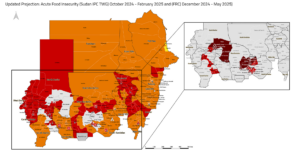The Integrated Food Security Phase Classification (IPC) officially declared a famine in parts of North Darfur and the Nuba Mountains region, along with imminent famine in parts of South Darfur. Sudanese authorities in Port Sudan reportedly suspended its collaboration with the IPC on the eve of the report.
In its latest Acute Food Insecurity Projection for Sudan, published yesterday, the IPC said that Abu Shouk and El Salam camps for displaced people in North Darfur, and parts of the Nuba Mountains, are now experiencing Phase 5 food insecurity, the highest level on the scale. This is the third famine declared globally in 20 years, when the IPC launched its monitoring system.
Five additional areas in North Darfur—Um Kedada, Mellit, El Fasher, El Taweisha, and El Lait—are projected to face famine within six months. The IPC also flagged 17 areas in the Nuba Mountains and parts of North and South Darfur as being at significant risk of famine.
Famine was first declared in North Darfur’s Zamzam camp, home to half a million people, in August. A famine designation requires meeting three criteria: more than 20 percent of the population must face severe food shortages, one in three of children must suffer from acute malnutrition, and at least two people per 10,000 must die each day from hunger-related causes.
At least 638 thousand people are currently facing Phase 5 (catastrophe) food insecurity in Sudan, according to the report.
Although Sudan’s harvest season would typically alleviate food shortages, the IPC predicts worsening food insecurity between December 2024 and May 2025. It projects 24.6 million people—nearly half the population—will face acute food insecurity during this period.
“This marks an unprecedented deepening and widening of the food and nutrition crisis, driven by the devastating conflict, which has triggered unprecedented mass displacement, a collapsing economy, the breakdown of essential social services, and severe societal disruptions, and poor humanitarian access”, the report states.
IPC withdrawal
Sudan’s acting agriculture minister, Abubakr El Bishri, suspended the country’s participation in the Integrated Food Security Phase Classification (IPC) system. In a letter to the IPC on Monday, El Bishri accused the organisation of “issuing unreliable reports that undermine Sudan’s sovereignty and dignity”, Reuters reported.
The Civil Democratic Forces alliance, better known as Tagadom, strongly criticised the decision in a statement on Monday.
“In a series of irresponsible and repeated decisions,” Tagadom says, “the Port Sudan Authority has announced its withdrawal from the Integrated Food Security Phase Classification (IPC).
“This unethical policy, which involves denying the crises facing the population and downplaying their suffering, highlights the Port Sudan Authority’s lack of transparency regarding the humanitarian situation.
The statement accused the Sudanese authorities in Port Sudan of continuing practices from Sudan’s previous regime, which it said “consistently denied humanitarian crises and refused to cooperate with the international community and its specialised institutions.”
El Bishri has previously denied reports of famine. In September, he told Al Jazeera that “all the talk about famine in Sudan is aimed at opening the borders to smuggle weapons and equipment to the rebel forces, and to pave the way for the entry of foreign forces.”
The post Famine declared in five areas of Sudan as govt withdraws from IPC appeared first on Dabanga Radio TV Online.
Source: dabangasudan









